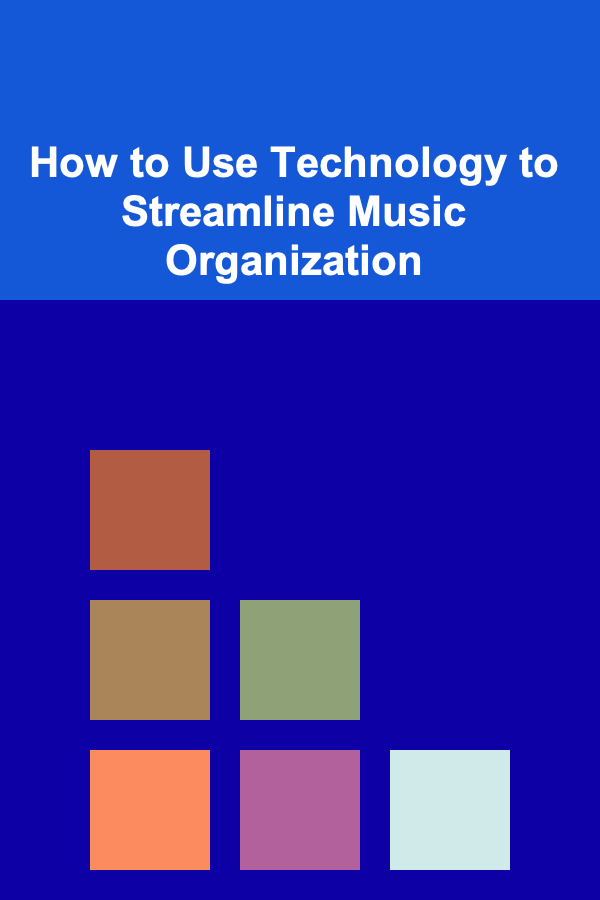
How to Use Technology to Streamline Music Organization
ebook include PDF & Audio bundle (Micro Guide)
$12.99$11.99
Limited Time Offer! Order within the next:

In an age where technology permeates every aspect of our lives, musicians and composers are increasingly relying on digital tools to streamline their music organization. Gone are the days of bulky folders filled with paper sheet music and handwritten notes. With the rise of music notation software, digital libraries, and cloud storage solutions, musicians can now manage their music collections with unprecedented efficiency. This article will explore various technological tools and strategies for organizing music effectively, enhancing both practice routines and performance preparation.
Understanding the Importance of Music Organization
Music organization is crucial for musicians at all levels, from beginners to professionals. A well-organized music library not only saves time but also enhances creativity and reduces stress. Here are some key reasons why music organization is important:
1. Enhanced Accessibility
Having a structured system allows musicians to quickly access the pieces they need, whether for practice, performance, or composition. This ease of access can lead to more efficient rehearsals and greater productivity.
2. Improved Focus
An organized music environment minimizes distractions. When everything is in its place, musicians can concentrate on their performance or practice without wasting time searching for materials.
3. Better Preparation for Performances
For performers, knowing exactly where your music is and having it easily accessible can make a significant difference in preparation. This means less anxiety and more focus on delivering an outstanding performance.
4. Encourages Consistency in Practice
An organized approach to music can encourage regular practice habits. Musicians are more likely to stick to a routine when they can easily locate their materials.
Digital Tools for Music Organization
The digital age offers a plethora of tools designed to help musicians organize their music efficiently. Below are several categories of technology that can aid in this endeavor.
3.1. Music Notation Software
Music notation software such as Finale , Sibelius , and MuseScore allow musicians to create, edit, and print sheet music digitally. These programs provide various features that make music organization easier:
- Editing Capabilities: Quickly make changes to compositions without needing to rewrite entire sheets by hand.
- Playback Features: Hear how compositions sound in real-time, which can help identify areas for improvement.
- Export Options: Save compositions in multiple formats, making sharing with others simple.
3.2. Digital Sheet Music Libraries
Platforms like MusicNotes , Sheet Music Plus , and IMSLP offer vast libraries of sheet music that can be accessed online. Benefits include:
- Instant Access: Download and print sheet music immediately.
- Searchable Databases: Easily find specific pieces by composer, genre, or instrument.
- Annotations: Many platforms allow you to annotate directly on the digital sheet music, so important notes are always visible.
3.3. Music Management Apps
Apps like Setlist Helper and GigBag enable musicians to manage their setlists and organize their music libraries. Features often include:
- Setlist Creation: Organize songs for performances efficiently.
- Key and Tempo Information: Keep track of song details that can aid in rehearsal and performance.
- Sharing Capabilities: Collaborate with band members by sharing setlists and songs.
3.4. Cloud Storage Solutions
Services like Google Drive , Dropbox , and OneDrive provide musicians with the ability to store music files securely in the cloud. Advantages include:
- Accessibility: Access your music library from any device with internet connectivity.
- Backup Solutions: Protect against data loss by regularly backing up your music files.
- Collaboration: Share folders with other musicians or collaborators to streamline joint projects.
Integrating Technology into Your Practice Routine
Using technology to enhance your practice routine can lead to more effective learning and improved performance. Here are some ways to integrate tech into your practice sessions.
4.1. Creating a Structured Practice Schedule
Using apps or calendars, musicians can create a structured practice schedule that allows them to allocate time for different aspects of their development:
- Daily Goals: Set specific goals for each practice session (e.g., mastering a particular section of a piece).
- Time Management: Use timers or scheduling apps to ensure focused practice without distractions.
- Progress Tracking: Record daily achievements to monitor improvement over time.
4.2. Using Metronomes and Tuners
Digital metronomes and tuners, available as apps or standalone devices, are invaluable tools for practicing rhythm and pitch:
- Metronomes: Help maintain consistent tempo and develop a sense of timing.
- Tuners: Ensure instruments are properly tuned, which is essential for developing good ear training.
4.3. Recording and Analyzing Practice Sessions
Recording practice sessions using smartphones or digital recorders allows musicians to evaluate their performance objectively:
- Self-Evaluation: Listen back to identify areas needing improvement.
- Goal Setting: Set new objectives based on recorded performances.
- Feedback from Teachers: Share recordings with instructors for constructive feedback.
Collaborating with Others Using Technology
Technology facilitates collaboration among musicians, making it easier to work together regardless of location.
5.1. Online Collaboration Tools
Platforms like Soundtrap , BandLab , and JamKazam enable musicians to collaborate on projects in real-time:
- Remote Recording: Work with other musicians by recording parts separately and combining them later.
- Real-Time Jamming: Play together virtually, which can be especially useful for rehearsing with bandmates who are far away.
5.2. Virtual Jam Sessions
Apps and software for virtual jam sessions can simulate in-person interactions, allowing musicians to practice together:
- Video Conferencing: Utilize tools like Zoom or Skype to rehearse with others.
- Shared Audio: Some platforms allow musicians to share audio in real-time, making collaborative practice seamless.
Organizing Music for Performances
When preparing for performances, an organized approach is essential for success.
6.1. Setlists and Performance Planning
Using technology to create setlists can simplify performance preparation:
- Digital Setlist Apps: Use apps to organize songs into setlists, including notes on arrangements or transitions.
- Performance Reminders: Schedule reminders for rehearsals and performances to stay organized.
6.2. Digital Sheet Music for Easy Access
Digital sheet music is a game changer for performers:
- E-Readers and Tablets: Use devices like iPads or specialized e-readers to store and display sheet music.
- Annotations: Easily annotate digital scores during rehearsals for quick reference.
Maintaining Your Digital Music Library
A well-maintained digital music library is crucial for long-term organization.
7.1. Regular Backups and Updates
To prevent data loss, it's essential to regularly back up your music files:
- Automated Backups: Use cloud services that offer automatic backup features.
- Manual Backups: Periodically download copies of your files to external drives.
7.2. Categorization Techniques
Organizing your digital library requires an effective categorization strategy:
- Folders by Genre: Create folders based on genres or styles for easy navigation.
- Tags and Metadata: Use tags or metadata features to add additional information about each piece (e.g., composer, key, tempo).
Case Studies: Successful Implementation of Technology in Music Organization
8.1. Individual Musicians
Many musicians have successfully integrated technology into their practice and organization routines. For example, a classical guitarist might use Noteflight to compose and share new pieces while utilizing cloud storage to keep all their sheet music accessible across devices.
8.2. Music Ensembles and Groups
Music ensembles, such as school bands or orchestras, can benefit from collaborative tools. For instance, a local community orchestra might use Google Drive to share rehearsal schedules and sheet music, ensuring that all members have the latest versions of pieces being performed.
Challenges and Solutions in Using Technology for Music Organization
While technology offers numerous benefits, challenges can arise:
9.1. Technical Difficulties
Musicians may encounter software glitches or compatibility issues:
- Solution: Keep software updated and learn troubleshooting techniques to handle common problems.
9.2. Overload of Information
With so many tools and resources available, musicians may feel overwhelmed:
- Solution: Start with one or two tools that meet your basic needs and gradually expand as you become more comfortable.
9.3. Dependence on Technology
Relying too heavily on technology may hinder traditional musicianship skills:
- Solution: Balance technology use with traditional practices, such as sight-reading and ear training.
Conclusion
Technology has revolutionized the way musicians organize their music, offering tools and strategies that enhance accessibility, improve practice efficiency, and facilitate collaboration. By embracing these digital resources, musicians can streamline their music organization processes, leading to greater focus, creativity, and ultimately, success in their musical endeavors. Whether you are a solo artist or part of a group, integrating technology into your music practice and organization can transform how you engage with your art. As technology continues to evolve, so too will the possibilities for enhancing the music experience.

Crafting the Perfect Resume: What Employers Really Look For
Read More
From Vision to Reality: Practical Tactics for Marketing Success as a Manager
Read More
How to Clean Your Washing Machine for Optimal Performance
Read More
How to Maximize Your Potential by Utilizing Online Resources for Learning New Skills
Read More
How to Organize Pet Accessories for Convenience
Read More
The Product Marketing Manager's Guide: Strategies for Driving Product Success
Read MoreOther Products

Crafting the Perfect Resume: What Employers Really Look For
Read More
From Vision to Reality: Practical Tactics for Marketing Success as a Manager
Read More
How to Clean Your Washing Machine for Optimal Performance
Read More
How to Maximize Your Potential by Utilizing Online Resources for Learning New Skills
Read More
How to Organize Pet Accessories for Convenience
Read More